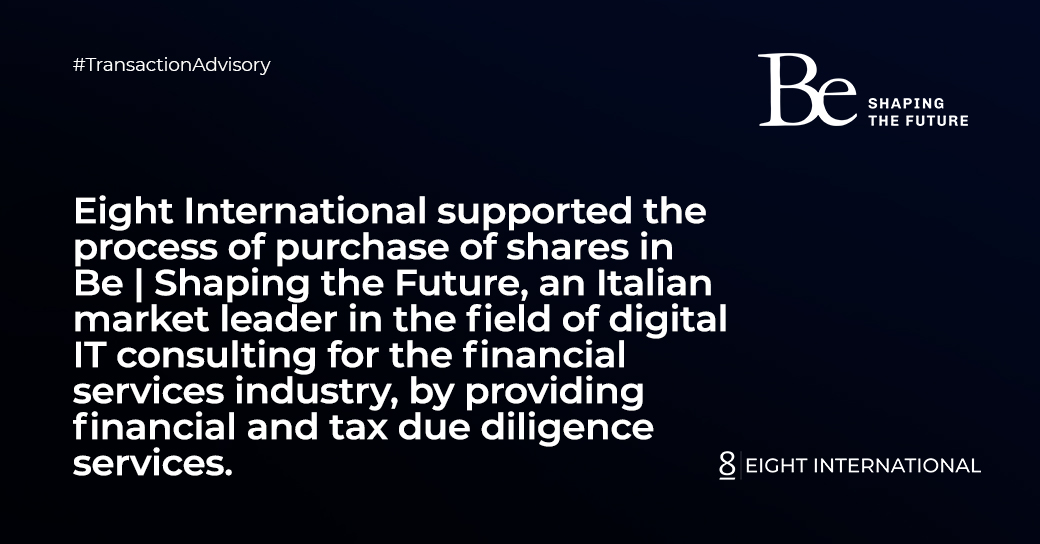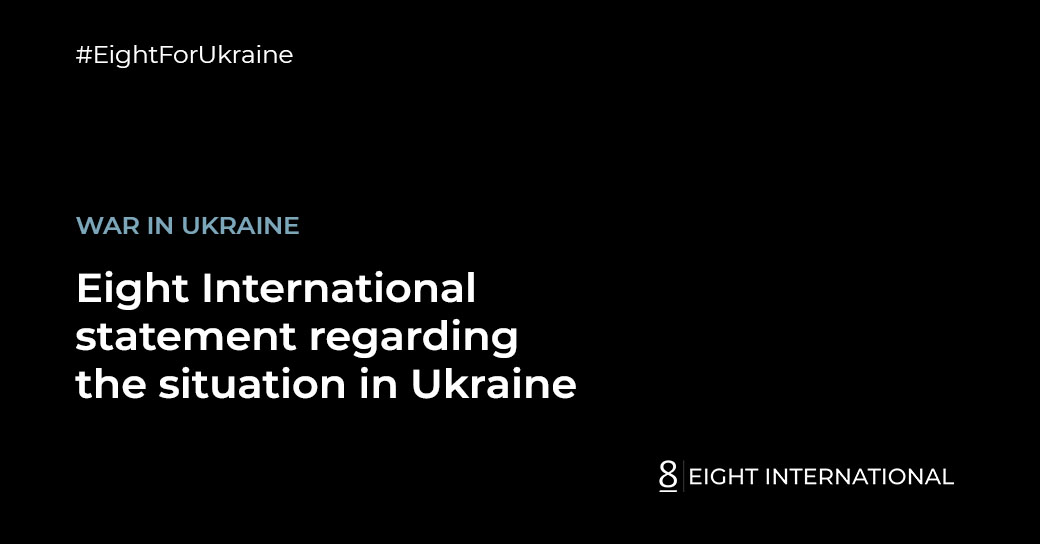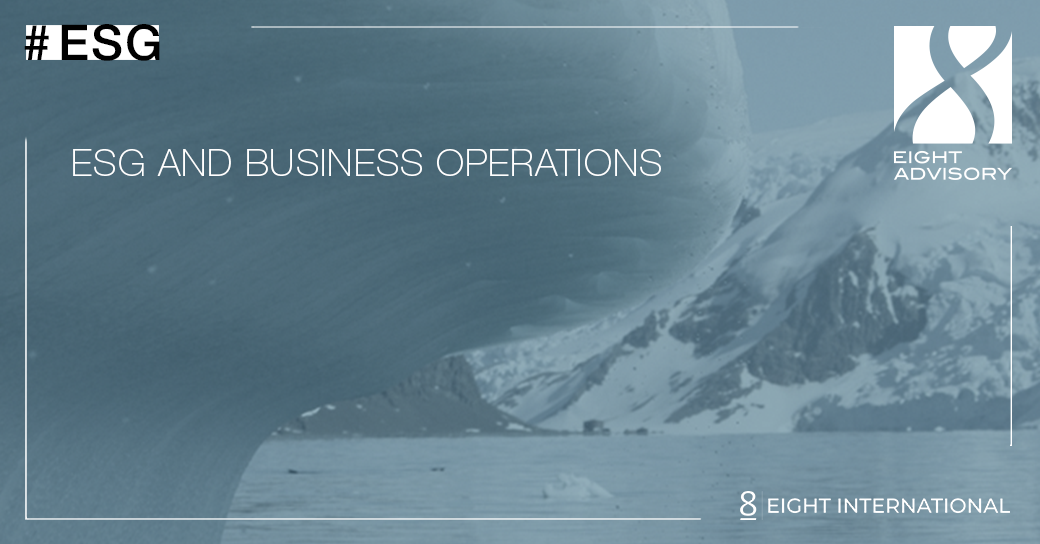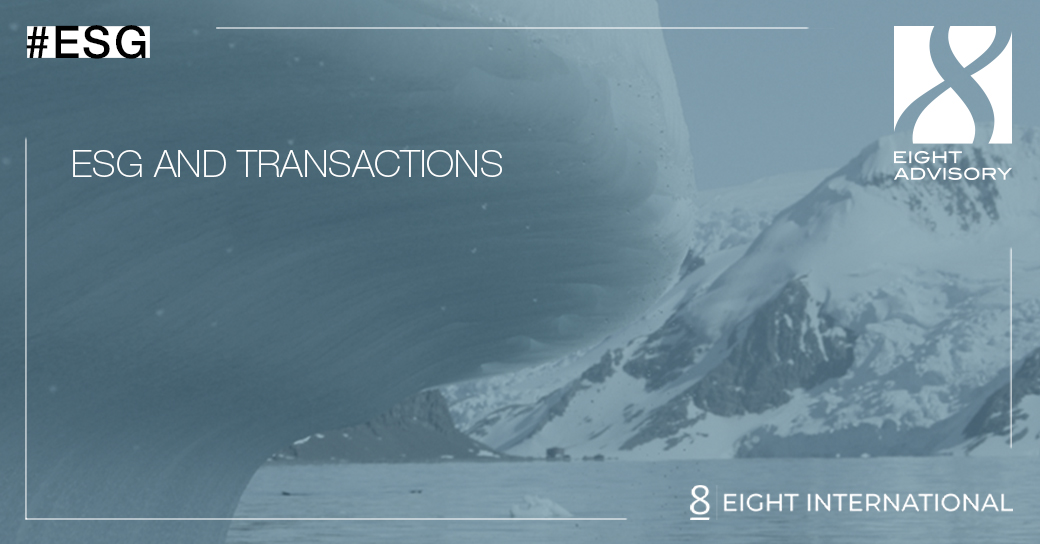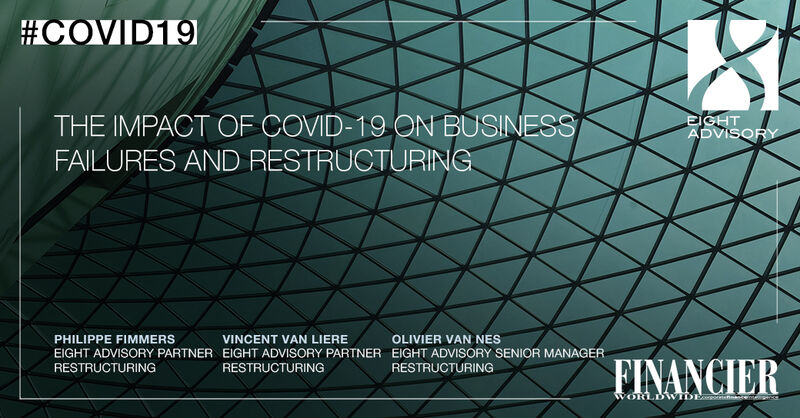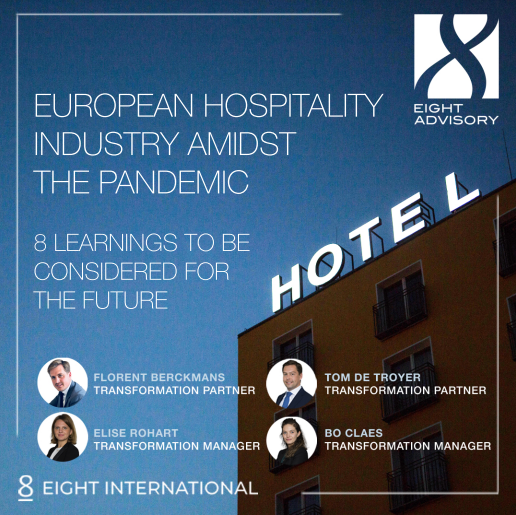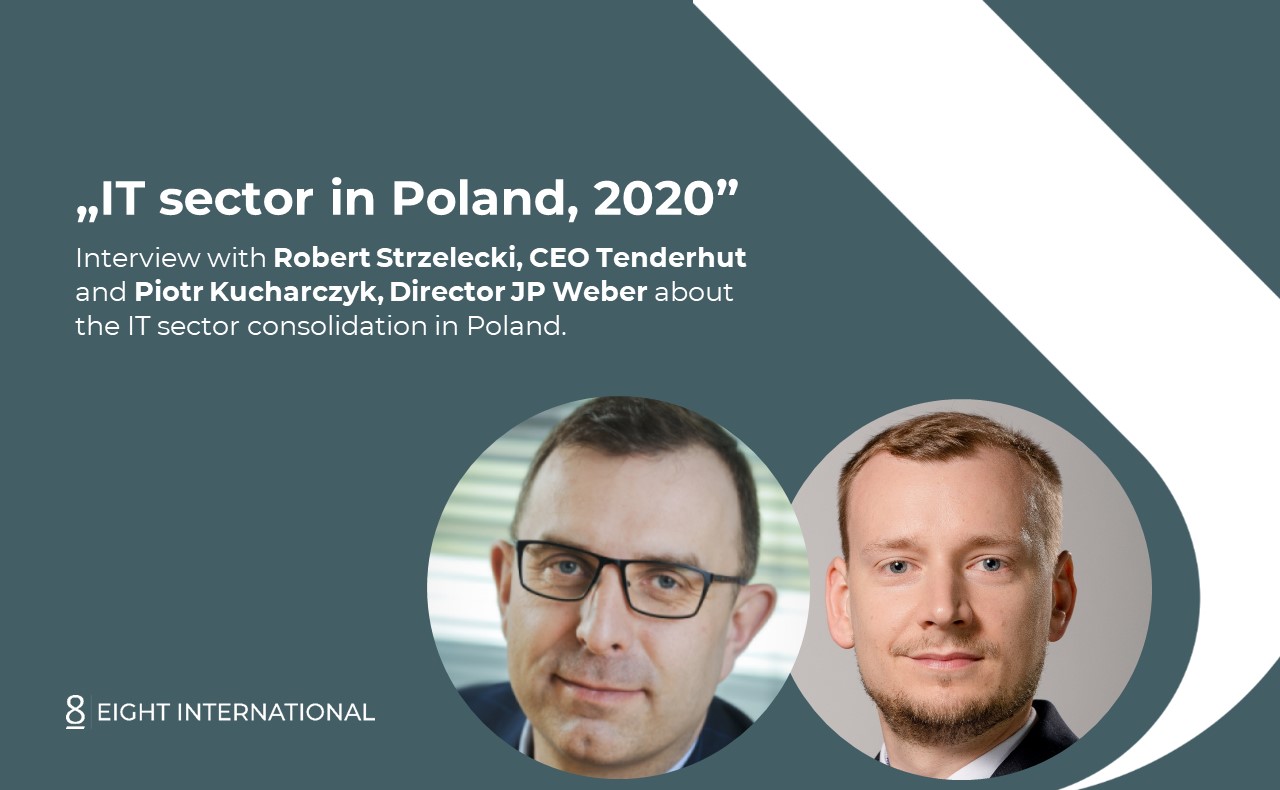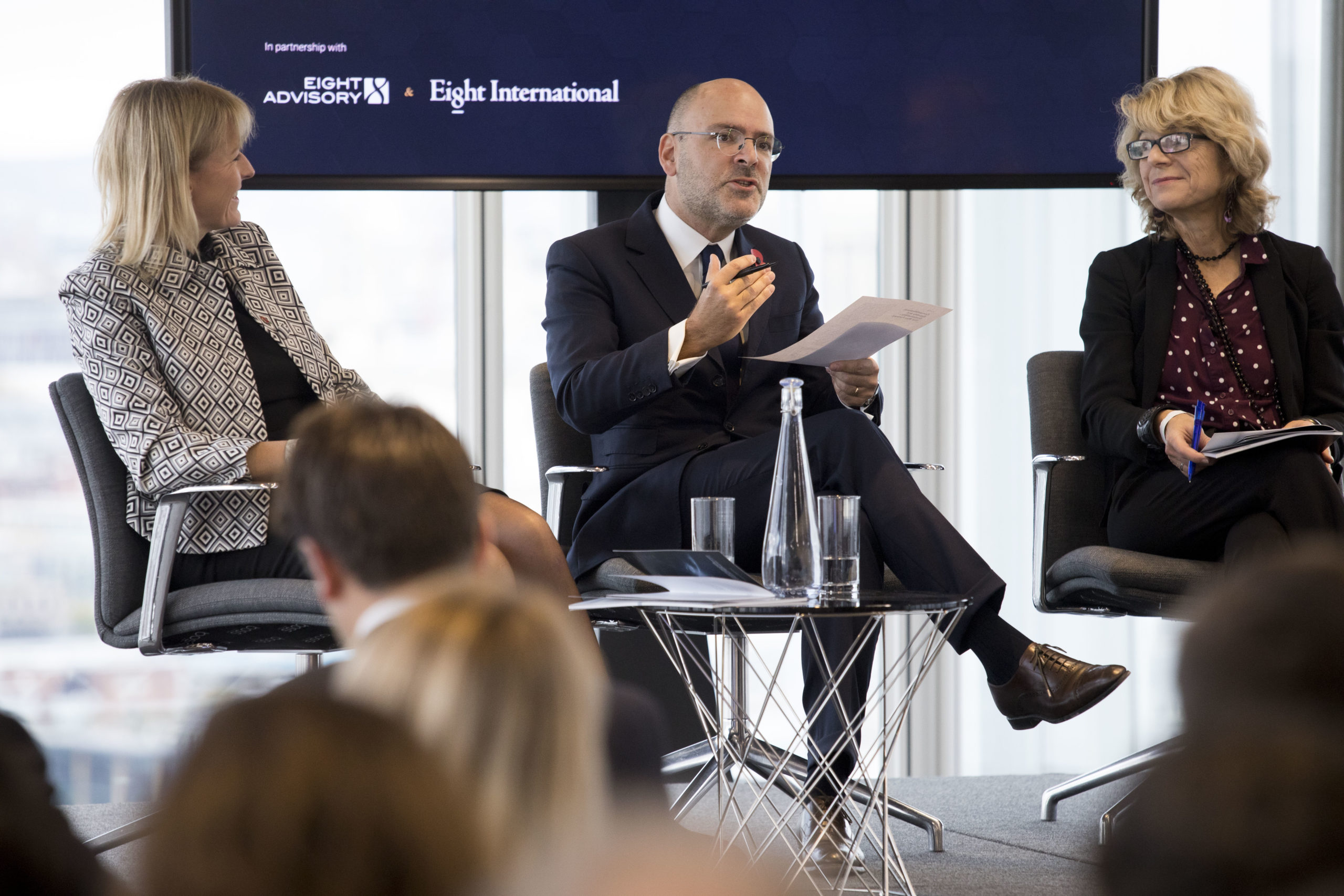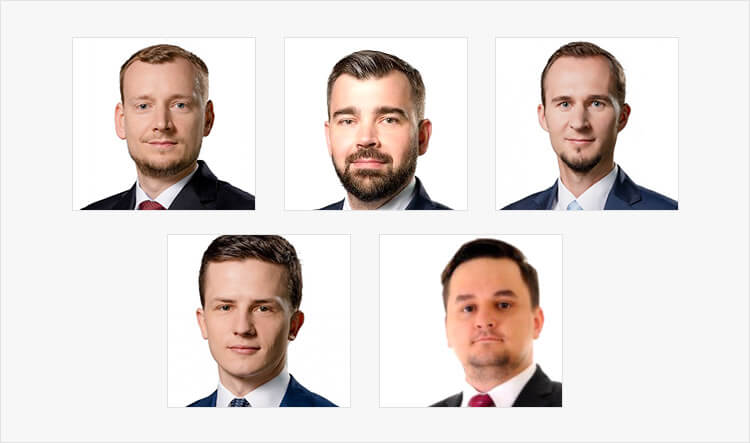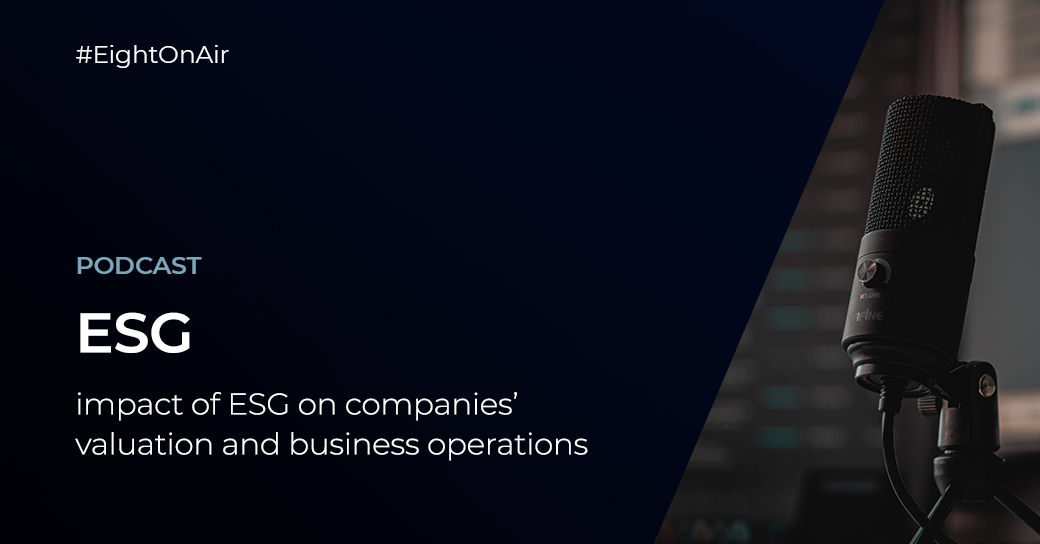
ESG – Environmental, Social and Governance – is not a new concept but in recent years it was pushed up the agenda not only of companies but also investors and banks. Up to now the focus was primarily on the environmental and governance aspects. However, examples like Deliveroo or boohoo.com show that social shortfalls can not only cause severe reputational damage but also impact a company’s ability to attract the right partners and investors, and can have significant impact on its valuation. Integrating ESG criteria in their investment process and knowing about potential ESG-related risks can be crucial when making an investment decision or taking over a company. Hence, Eight Advisory sees that more and more buyers and investors are implementing ESG parameters into their due diligence process.
In this epidose of Eight Advisory’s podcast Valerie Haller is talking with Hanut Dey, Director at Eight Advisory in London, about organisations shifting their focus from short-term profit-making to longer-term sustainability of profits with a strong ESG strategy, and how exactly ESG impacts businesses and companies’ valuations.
Valerie Haller: Welcome to the third podcast episode of Eight Advisory “Deals and Disruptions”. My name is Valerie Haller, normally I report from the stock market for the ZDF Heute journal. And today, I have the pleasure of hosting the next episode of the Eight Advisory podcast in English as we have a special guest today from the Eight Advisory London Office. Hanut Dey is with me today online. Hanut is a Strategic Valuations and Modelling Director at Eight Advisory UK, the subsidiary of the fastest-growing independent financial advisory firm in Europe, and will cover one of the hottest topics the business world is discussing right now, namely ESG. Hello Hanut.
Hanut Dey: Hi, Valerie. It’s lovely to be here today, even if it is only online. I’m excited to see where the conversation takes us.
Valerie Haller: Thank you so much, Hanut. I’m happy to be here as well. Let’s start with a standard question. How did you actually come to Eight Advisory and why?
Hanut Dey: Thank you so much, Valerie. It’s a long story, but I’ll give you the abridged version. I’ve spent most of my career at KPMG around 12 years, over two stints. In between, I went back to my home country of India and established my own business. This exposed me to the entrepreneurial aspects of starting up a new business that I was really very interested in and excited about. So, when Eight Advisory approached me at the start of the pandemic to help build the valuations practice in London, I just didn’t think twice. I spoke to a few people within Eight Advisory and the opportunity just felt very right. I joined Eight Advisory in April 2021 and being part of Eight Advisory’s entrepreneurial and pan-European culture, something that I was very excited about. It was a great opportunity to work with international experts who came from renowned consulting firms. And the really great thing is that they all share the same values that I do, not just when it comes to providing services to clients, but also how a team should be structured, its dynamic and how a team should collaborate, which is something that I feel is very important. An additional attractive point about Eight Advisory, I suppose, is that as part of my work, I’m actively encouraged to think creatively and explore different aspects, like, for example, ESG and its impact on company valuations. And it was an area that’s close to my heart and Eight Advisory really supported me in exploring this area also because it’s a brand new but increasingly important topic of research.
Valerie Haller: That’s very interesting. Let’s get straight to the core topic of this episode. And there’s really only one question that one can get us there. What does ESG mean?
Hanut Dey: Actually, that’s a very good question. ESG stands for environmental, social, and governance. In my opinion, ESG is an approach to evaluating the extent to which an organization works on behalf of all of its stakeholders rather than just investors or shareholders. A lot of people would describe ESG as an organization’s capacity to do good. But that’s really a vague and a very subjective concept. I prefer to think of ESG as a concept in which an organization shifts its focus from short-term profit-making to longer-term sustainability of profits. Building business resilience: so very much anchored in financial metrics. ESG in truth is not one holistic topic. It’s a concept that’s made up of many different facets. And separate attention, I believe, needs to be paid to the ‘E’, to the ‘S’ and to the ‘G’ aspects, as they can impact different organizations in very different ways.
Valerie Haller: Everybody now talks about ESG, but in fact, it’s not really a new concept, am I right?
Hanut Dey: You’re absolutely right. ESG in one form or another has been around for many, many decades. However, the way we think about ESG today really came about in the early 2000s, when a U.N. encouraged study called “Who Cares Wins”, first coined the term as we know it today. And then the U.N. came out with their principles for responsible investing which was also backed by a Freshfields report. At that time, the investment market really bought into Milton Friedman’s theory that organizations should focus on maximizing profits and that the integration of ethically driven factors into financial decision-making would in fact reduce financial returns. However, since then a number of academic papers and industry reports have come out that have highlighted and provided research for arguments to the contrary.
Valerie Haller: Okay. So, if it’s been around for so long, what is driving this sudden surge in the current level of interest?
Hanut Dey: That’s a very nuanced situation because like so many things there isn’t just one factor that was responsible for the uptick, but a coming together of many individual factors, such as, for example, the growing emphasis on climate change and the loss of biodiversity highlighted by the Paris Agreement and also the events of COP26 that was held last year. There’s obviously now an increased awareness of issues around social inequality, a lot of social movements like ‘Black Lives Matter’ last year, and the diversity and inclusion agenda are finally taking its importance as part of the boardroom considerations. And the one thing that I think is missed a bit is the fact that ESG when it was given birth in the early 2000s, was always considered, as I mentioned before, sort of a very vague and a qualitative concept. And I think that really came about because of the lack of the data tools that were available at the time to measure ESG impacts. But now we do have data tools, big data analysis, and machine learning A.I., and I think that is also driving the fact that ESG is becoming more measurable and therefore there is more attention being paid. And just final mention as well, because I think it’s worth noting that the interest in ESG, while there’s always been an upward trend, really increased exponentially during the pandemic in terms of the focus of ESG and the ESG assets in terms of assets under management.
Valerie Haller: I’m curious, please, could you give me examples?
Hanut Dey: Sure. There are numerous examples littered all over the globe of this happening in terms of reputational damage on ESG topics for corporates. But I’ll give you a few, I suppose, high-profile examples. We have the example of ORPEA in France, which is the care home provider which lost a significant proportion of value in January this year, when a scandal broke out on the stories of abuses at its care homes. The head of the company had to resign, the government got involved as well. Other examples are boohoo.com a fashion retailer in the UK that lost 50% of its market value when negative news came out about bad working and labor practices in its supply chain, notably in its Leicester factory. And then obviously we have Deliveroo, which is been as the worst IPO in the history of the LSC, where investors really stayed away from Deliveroo because of issues with its workers‘ rights and how they remunerate the workers and whether they’re actually freelance individuals and also issues with the governance structure within Deliveroo in terms of the founder and the level of control that he maintained. Deliveroo today, I think, is around 30% of the value of his original IPO price. This really highlights in a tangible way how not addressing these risks or not having a clear and strong ESG strategy that you can communicate to the market can really have a tangible impact on the value of your business.
Valerie Haller: The financial drivers are understandable and on the whole, it’s really good news. Adapting companies‘ business models to the new reality is a guarantee of a lasting change. So, how exactly would ESG impact businesses?
Hanut Dey: I’m not sure where to start, but I’ll try and keep it brief. Let’s go through them individually the ‘E’, the ‘S ‘, and the ‘G’ at a high level. ‘E’, is all around the impact of how changing regulatory environment and the technology landscape around climate change is impacting organizations. As well as the direct impact of climate change on your operations for example, if you’re a factory or a plant next to the sea, how are rising sea levels going to impact your plant. Then there are also other impacts that have been highlighted by the COP26 in terms of the loss of biodiversity as well as things that have been considered historically, quite a bit like water and wastewater management and energy consumption. With ‘S’ it’s all about equitable pay, working practices, social inequality, and modern slavery. And one thing to mention as well is that the focus shouldn’t really always only be on your own operations, but also on your supply chain in terms of the partners you choose, where you get your raw materials from, and which organizations are carrying out maintenance and facility services in your plants. So, it’s much wider than what was traditionally your immediate purview of concern. And for ‘G’ it’s all around the appropriate governance structure. And this is something that, you know, that’s been discussed and debated a lot more than, I would say the ‘E’ and the ‘S’ impacts. But it’s all about how to prevent fraud, mismanagement, and any sort of risk control. But also increasingly now, the DNI agenda, which is driving the improvement and better focus of the resilience of the business and encourage better decision making.
Valerie Haller: And based on that Hanut, what are the challenges? What are the opportunities? What would you say?
Hanut Dey: The challenges, I would say, are very much for CFOs and for organizations to keep on top of the mountain of sort of changing regulations and the reporting requirements, while still continuing to outperform the market and what the market is doing. A lot of organizations have ESG strategies in place nowadays but the challenge is not so much to have an ESG strategy. It’s more to implement a strategy and then slowly iterate, test it against your own operations and then continually improve it. Make it embedded as part of your strategic, financial decision-making, and operational risk management processes. From a financing perspective now it’s so much easier and cheaper for ESG-friendly organizations to get access to capital. Many lending institutions have instituted sustainable bonds and have said that they’re going to stop lending to, for example, fossil fuel companies. On the equity side, the interest in ESG is really driving market dynamics such that there is, I would say, more demand than there is supply. It’s pushing the negotiating power into the hands of the target companies that do have a strong ESG strategy. One of my favorite examples is “Who Gives A Crap”, it’s an Australian company that sells forest-friendly toilet paper. They went through a funding round, were massively oversubscribed, and attracted a large pool of investors looking for ESG targets. It enabled them to be very picky and choose who their long-term partner was going to be. It needed to be an investor that was aligned with their values and was looking at the longer term, not for a quick three / five-year turnaround. So patient capital is increasingly becoming an important term that’s being mentioned in the same conversations as ESG. And all of these aspects in terms of financing and equity investment have meant that ESG due diligence is slowly becoming part and parcel of every transaction. This wasn’t really a concept as part of a DD report five or six years ago. But now in the majority of transactions, buyers are implementing ESG due diligence in one way or the other. The other benefits are from an HR perspective. Many studies have shown that, if you have a clear ESG strategy it helps you motivate your workforce in a way that increases productivity, and helps you retain your staff because people want to work for such organizations not just for the financial benefits, but for the fact that the firm‘s values align with their own personal values.
Valerie Haller: Huge changes seem to be going on there, Hanut. You’re a valuation expert who, just like your clients, needs to be comfortable dealing with ambiguity. The world has recently been quite volatile, starting with the pandemic and now with the war in Ukraine. A lot has been said about the former, and I frankly wouldn’t be myself if I didn’t ask you about how the current war factors all into all of this.
Hanut Dey: Firstly, I just want to say that the Ukraine war, like any war, is first and foremost a really tragic human occurrence. However, what is being shown is that the immediate impact of the war is being felt by Ukraine and its neighbours. But the economic ramifications are having an impact globally, as we are seeing with sort of oil prices and the availability of certain commodities. So this is like a really, truly global issue. From an ESG perspective, I would like to focus on one aspect, which is the influence that Russian oil and gas have had on the war and the dependence of Europe on Russian oil and gas as a fuel source. This has been a risk that’s been highlighted over and over again over the past few years. It’s not a new risk. But not enough was done to address it and to make European countries more energy secure. And now we are all suffering the direct and indirect consequences of that inaction. I think what this highlights is the importance of bravery in early decision making, and again, as I keep repeating, switching the focus to the longer-term rather than to the shorter-term, as that’s really the only way to avoid this kind of events, political as well as economic. And you’re right, the world, and I’ve seen it as well over the past few years, is slowly getting more and more volatile. And with climate change, actually, the probability of high impact events is increasing, which means that, from a forecasting and business planning perspective, it’s really interesting because I don’t think we can afford to assume that the next five years are going to be as business as usual, and making grow a company or our organization by 10% every year or in line with inflation. I think what it means then is that from a planning perspective, what we need to do as standard is to actually build in an expectation for an increasing number of high-impact events and really test our business resilience against that.
Valerie Haller: The truth, again, is that business management and transactional consulting are not so far from real life as many people perhaps like to think. I think we should apply the same analysis approach in our private lives. Thank you Hanut for letting me guide you through this podcast today. It was incredibly interesting what you had to say, and it certainly changed my view on things in certain aspects. I’m looking forward to hearing from you again.
Hanut Dey: Thank you very much for a pleasant conversation, Valerie. I’m definitely looking forward to hearing from or even better, hopefully seeing you again at some point. And thank you to the listeners for the interest and for putting up with us for so long.
